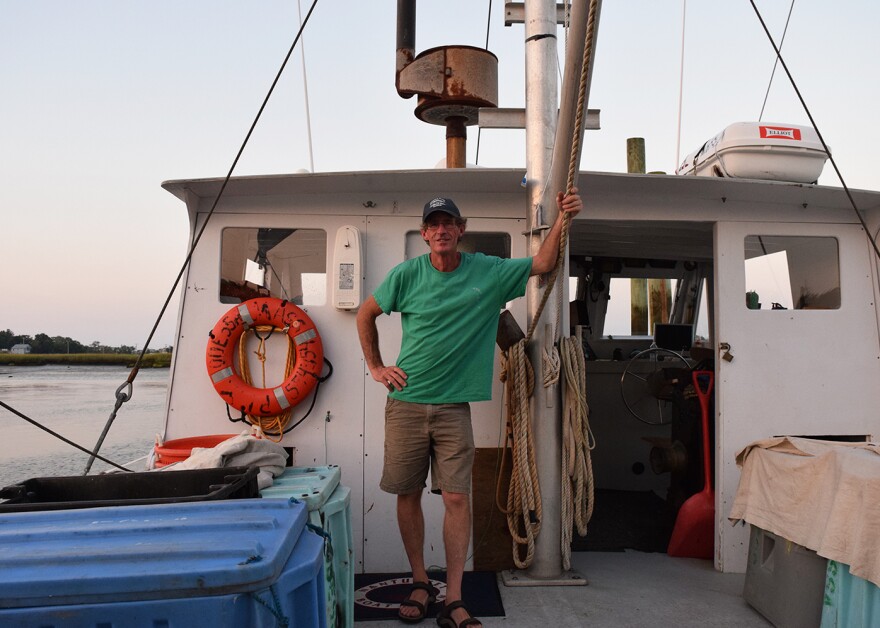New England’s fishermen are feeling the effects of climate change in fundamental ways, as fish populations respond to changes in the ocean environment. For scientists trying to understand this dynamic system, one big challenge is getting enough data. To address that problem, a number of scientific projects are building on an unlikely collaboration, enlisting data collection from the men and women who are out on the water most.
This story is part 1 of a 3-part series, Indicator Species: New England's Fishermen and the Challenges of Climate Change.
Jim Violet has been fishing for 37 years. On a typical trip, he leaves from Newport, Rhode Island for the long ride to the Outer Continental Shelf. At the end of an 18-hour fishing day, he takes one extra step - for science.
He and his crew drop a small white cylinder off the deck of the boat to the ocean floor - 200-300 feet deep - and haul it back up with a winch. It weighs about 30 lbs, and it’s designed to measure the temperature and the salinity of seawater, up and down the water column.

When the probe returns to the surface, the data it collects gets stored on an iPad. When Violet gets home from a fishing trip, he uploads the information to a database. It contains over 500 other profiles of the water column, taken by other New England fishermen, at different times over the past four years.
It's a project called the Shelf Research Fleet, organized by the Commercial Fisheries Research Foundation in partnership with the Woods Hole Oceanographic Institution (WHOI). Collectively, the fishermen’s data is providing a rich, detailed picture of what’s happening on the Northeast Continental Shelf.
The Shelf is the relatively shallow area stretching more than a hundred miles between the coast and the deep ocean.

Anna Mercer, head of the Commercial Fisheries Research Foundation, says the Shelf has been studied since the 1930’s, but scientists still have a lot of open questions about it, like "how it's changing over the seasons, how it's changing over the years, and ultimately, how it's changing long-term, in the face of climate change."
Glen Gawarkiewicz, an oceanographer at WHOI, analyzes the data the fishermen collect. In the last 5-10 years, he's seen drastic changes to the Shelf. "One of the things that I find most disturbing is this increasing influence of offshore Gulf Stream waters coming onto the Continental Shelf," he says.
The Gulf of Maine, which is part of that Continental Shelf, is known to be warming faster than most of the world’s oceans, with impacts on everything from weather to fishing.
For fishermen, they’re seeing those impacts most dramatically in the fish that are coming up in their nets. Tim Barrett, a longtime trawler from Cape Cod and the South Shore, says he's seeing more squid and herring, and exotics like triggerfish, butterfish, and scup in areas he hadn't seen them in before.
Barrett is working with Kevin Stokesbury, a fisheries scientist at UMass Dartmouth, on a different collaboration between scientist and fishermen—one that aims to improve fish counts, by putting cameras on fishing gear, and getting a live video feed from the ocean floor.
The ultimate goal is to use facial recognition software, as in a marathon, to identify each individual species, and count each individual fish. According to Stokesbury, the software is currently able to categorize different types of fish – roundfish, flatfish. They're working to improve the technology and build out their image library, to get to species identification.
Stokesbury says the project has been a real working partnership between scientists and fishermen, “It’s hard to define out where the fishermen stop and the scientists start,” he says. The fishermen have been instrumental in designing equipment, figuring out how to mount the cameras, deploying the gear and towing the nets.
Having a better idea of how many cod, flounder, and other fish are out there could impact fisheries catch limits, which could help fishermen like Barrett in the long run.
For scientists, teaming up with fishermen gets them a bigger dataset at a lower cost.
Mercer, from the Commercial Fisheries Research Foundation, says there are other benefits, too. Involving fishermen with the research, she says, helps them "start to understand why it’s being done, what it means, and [to] accept and trust the results of that work."
It’s helping to repair a rift between the science and fishing communities, that dates back decades. Fishermen have long complained that the data used by fisheries management doesn’t reflect what they’re seeing on the water.
Barrett, the trawler, says getting fishermen involved with data collection helps to bridge that gap. "The warming of the waters always kind of felt like a 'Chicken Little'-type warning," he says. "But when you actually hear from one of your peers say 'This is really changing! This is a strikingly different temperature, and it’s the most I’ve ever seen, and it's the highest in 50 years...'" He's more likely to trust the data and the message when it comes from a fellow fisherman.
Rising water temperatures and changing ocean currents will have huge effects on how fishermen make a living.
Working with scientists, fishermen facing the impacts of climate change are gathering data that both sides believe in. For fishermen like Tim Barrett and Jim Violet, this could make all the difference in the struggle to stay afloat and to keep fishing.

Here are some recipe ideas and tips from chef Scott Roberston for preparing Jonah Crab at home.
Pien Huang is an environmental reporting fellow with the GroundTruth Project, stationed at WCAI.
For more on GroundTruth's reporting on climate change visit thegroundtruthproject.org.







